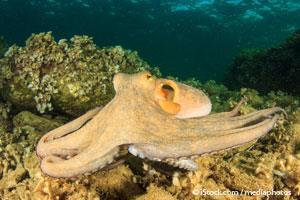This Mother Never Left Her Eggs for Four and a Half Years, Not Even to Eat

Story at-a-glance
- From May 2007 through September 2011, a team of researchers watched a deep-sea octopus brood her eggs while perched on a rocky ledge 4,600 feet below the ocean’s surface. That’s an amazing four and a half years spent keeping several dozen eggs oxygenated and safe from predators
- Over the months and years, the researchers watched the eggs grow larger. They could even see the tiny hatchlings inside their translucent shells. During 18 dives over 4.5 years, the researchers never saw the mother octopus leave her eggs, or even eat
- After such a long time in their shells, the offspring of this species of octopus are born larger than other hatchlings and more highly developed. They are able to survive on their own immediately
By Dr. Becker
For four and a half years, researchers watched a deep-sea octopus brood her eggs. Four and a half years… can you imagine? For all that time, and at a tremendous personal cost, the mama octopus kept her eggs healthy and protected from predators.
According to ScienceDaily:
“This feat represents an evolutionary balancing act between the benefits to the young octopuses of having plenty of time to develop within their eggs, and their mother's ability to survive for years with little or no food.”1
Brad Seibel, one of the researchers and an associate professor of biological sciences at the University of Rhode Island, believes these findings reveal just how little we know about life in the deep sea. “From shallow-living species we have developed limited and limiting ideas abut the capabilities of animals,” says Seibel.
Octopus Broods Eggs on Rocky Ledge in Monterey Canyon
For the past 25 years, a team of Monterey Bay researchers has performed 3 or 4 surveys a year of deep-sea animals in Monterey Canyon. During a survey in May 2007, the team first encountered a female octopus perched on a rocky ledge about 4,600 feet below the ocean surface. The team realized the octopus, of the species Graneledone boreopacifica, had not been there a month earlier.
During the next 4.5 years, the researchers dove at the site 18 more times and observed the female octopus each time. They knew it was she due to the distinctive scars on her body. As time passed, the translucent eggs she was brooding grew larger, and the baby octopuses could be seen inside.
The researchers also observed that the mother was slowly losing weight, and her skin grew lax and pale. During those 18 dives, they never saw her leave her eggs or eat.
The last sighting of the brooding octopus by the researchers was in September 2011. She was gone when they dove a month later. In an article published in the journal PLOS ONE,2 the research team reported that all they found in the spot she had occupied for so long were the remains of empty eggs. From the shells, they were able to determine the octopus had been brooding around 160 eggs.
Long Brooding Time Produces Large, Highly Developed Hatchlings
The eggs of the G. boreopacifica octopus require lots of oxygen so the babies can develop inside. This requires the mama octopus to continuously wash the eggs in oxygenated seawater and insure no silt or debris accumulates on them. The mother must also guard her eggs from predators.
Because the babies spend so much time developing in their eggs, by the time they emerge from their shells they are fully capable of surviving on their own. In fact, newly hatched G. boreopacifica are bigger and better developed than the hatchlings of any other species of octopus or squid.
But long brooding times in an animal like the octopus, which doesn’t live very long, is problematic. According to the researchers:
“The trade-off within the reproductive strategy of deep-living octopods is between the mother’s ability to endure a long brooding period and the competitiveness of her hatchlings. Graneledone boreopacifica produces hatchlings that are very highly developed, which gives them the advantage of a high potential for survival.”3
Since most female octopuses lay only one set of eggs and then die right around the time the eggs hatch, and since most shallow-water octopuses and squid live just a year or two, it appears G. boreopacifica not only has the longest brooding time of any animal, but she may also be one of the longest lived octopuses as well.
© Copyright 1997-2015 Dr. Joseph Mercola. All Rights Reserved.
http://healthypets.mercola.com/sites/healthypets/archive/2015/03/03/deep-sea-octopus.aspx